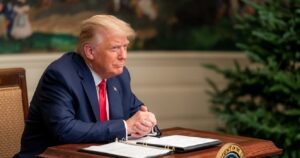FBI dismisses agents for kneeling at 2020 BLM demonstration
Well, it seems even the FBI isn’t immune to the consequences of bending the knee—literally. Several agents have reportedly been terminated for kneeling during a 2020 Black Lives Matter protest in Washington, D.C., a move that’s ignited a firestorm of controversy. Who knew a gesture could cost you your badge?
The crux of the matter is this: multiple FBI agents were dismissed after participating in a protest following the tragic death of George Floyd, with their actions now under scrutiny for allegedly failing to meet bureau standards, while sparking accusations of rights violations and demands for a congressional probe.
Let’s rewind to May 2020, when nationwide unrest erupted after George Floyd’s death in Minneapolis, caused by a police officer’s knee on his neck. Violent protests, riots, and looting swept across cities, including Washington, D.C., where federal monuments and buildings became flashpoints. It was in this tense atmosphere that some FBI agents found themselves on the front lines.
Agents Caught in Protest Controversy
Tasked with guarding federal property, these agents weren’t exactly trained for crowd control, a point raised by both current and former bureau officials. As CNN reported, “FBI agents generally aren’t trained to do crowd control.” Deploying them in such volatile situations had many worried about deadly outcomes, and rightfully so.
During one confrontation with demonstrators in D.C., photographs captured several agents kneeling—a gesture widely seen as solidarity with the Black Lives Matter movement. Breitbart News published an image of the moment, which has since become a lightning rod for debate. Turns out, actions do have consequences, especially when they’re caught on camera.
Fast forward to April, when these same agents were reassigned as part of an initiative under then-President Donald Trump to purge what was described as “woke” influences from the intelligence community. Breitbart reported this as a push to eliminate political elements from federal agencies. Whether you see it as a necessary cleanup or an overreach, the intent was clear.
Firings Spark Legal and Ethical Debate
Now, the FBI has taken the drastic step of firing these agents—approximately 20, according to two unnamed sources cited by the Associated Press. The exact number remains unclear, but the FBI Agents Association confirmed on Friday that several dismissals occurred. This isn’t just a personnel issue; it’s a full-blown controversy.
The association didn’t mince words, accusing FBI Director Patel of trampling on the agents’ rights. They stated, “Patel chose to again violate the law by ignoring these agents’ constitutional and legal rights.” If true, that’s a serious charge, one that suggests the rulebook was tossed out the window.
The association went further, demanding a congressional investigation into what they call unlawful firings. They argue that due process was ignored, painting a picture of a bureau more concerned with optics than fairness. For those of us skeptical of unchecked power, this raises eyebrows.
Director Patel Denies Political Pressure
Director Patel, however, isn’t backing down. At a recent congressional hearing, as paraphrased by the Associated Press, Patel denied taking orders from the White House on whom to dismiss, insisting that those fired simply didn’t meet FBI standards. A convenient explanation, perhaps, but is it the whole story?
Patel’s stance suggests a commitment to accountability, which many conservatives would applaud—standards matter, especially in an agency as critical as the FBI. Yet, when you’ve got an association crying foul over legal rights, it’s hard not to wonder if this is less about standards and more about signaling. After all, perception often trumps reality in D.C.
Let’s not forget the broader context: the 2020 protests were a cultural turning point, with gestures like kneeling becoming symbols of a progressive agenda that many Americans, especially on the right, view with skepticism. While empathy for Floyd’s tragedy is universal, the expectation for federal agents to remain neutral in such charged moments isn’t unreasonable. Mixing personal beliefs with duty is a slippery slope.
Balancing Duty and Personal Beliefs
For the agents, the decision to kneel may have felt like a moral stand, but it’s clear the FBI brass saw it as a breach of protocol. In a job where impartiality is paramount, even a symbolic act can be interpreted as taking sides. That’s a tough pill to swallow, but it’s the reality of public service.
The fallout from these firings isn’t just about the individuals involved—it’s about the precedent it sets. If agents can be dismissed for expressing a viewpoint, however quietly, what does that mean for free expression within federal agencies? On the flip side, if standards aren’t enforced, does the FBI risk becoming a political pawn?
As this story unfolds, the call for a congressional investigation might be the only way to get clarity. Both sides deserve a fair hearing, whether it’s the agents claiming unfair treatment or a director insisting on maintaining discipline. For now, this saga is a stark reminder that in today’s polarized climate, even a knee can spark a national reckoning.




